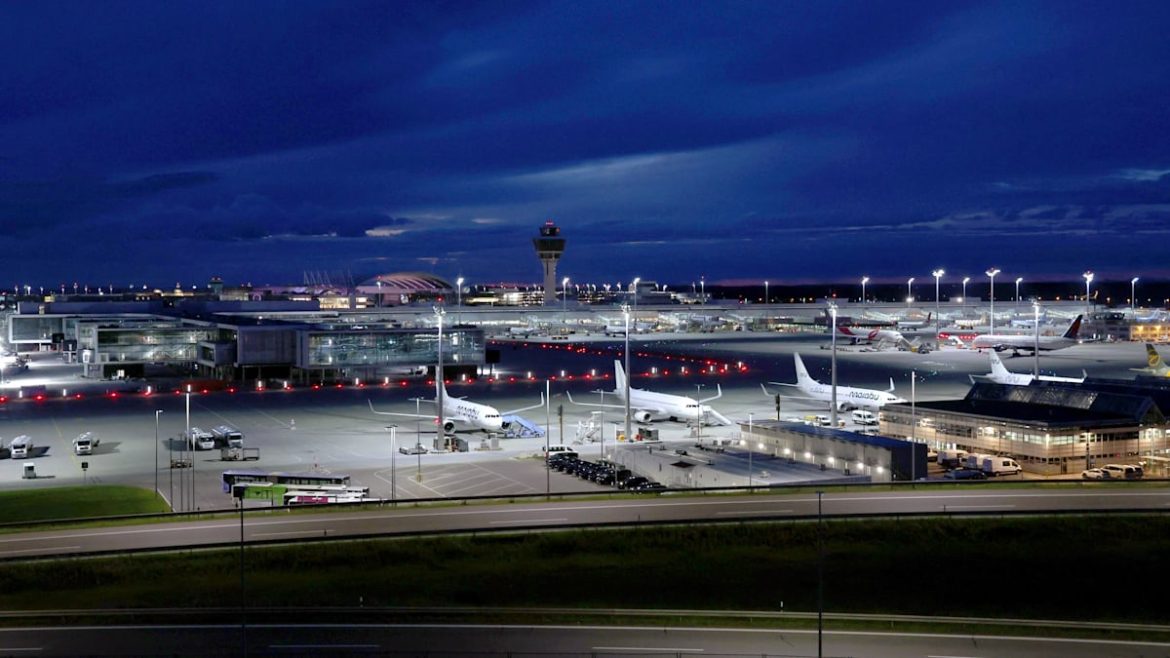Munich Airport was forced to halt flights for a second consecutive night on Friday after drones were spotted near both runways, leaving thousands of passengers stranded and exposing Europe’s growing vulnerability to aerial disruption.
Flights were suspended from 9.30 p.m., with 23 arrivals diverted and 46 departures either delayed or cancelled. Around 6,500 travellers were affected. Police helicopters patrolled the airspace, but the drones vanished before they could be intercepted. Airport staff provided blankets and camp beds, echoing the chaotic scenes of the previous evening.
The initial shutdown on Thursday night followed similar sightings near the airport perimeter and surrounding towns.
Across Europe, airports in Denmark, Norway and Poland have also reported temporary closures after six “unidentified large-winged aerial systems” appeared. Some eastern European states, including Romania and Estonia, have publicly pointed the finger at Moscow. The Kremlin has denied any involvement.
Yet Berlin, Brussels and Paris have remained cautious. Officials speak vaguely of “investigations” and “security incidents,” avoiding any direct accusation of Russian aggression. That restraint has prompted criticism from eastern capitals, which regard the incursions as hostile acts.
The hesitancy is partly strategic. Small drones are hard to detect and trace. They can fly low, follow pre-programmed routes, and vanish without leaving evidence. Naming Russia without certainty risks diplomatic escalation with little guarantee of a coordinated European response.
Economic and political caution also plays a role. Germany, heavily dependent on imported gas, is wary of inflaming tensions with Moscow. Europe faces a delicate winter of energy uncertainty, fragile supply chains and restive electorates. Confrontation could carry high economic and political costs.
Strategic culture compounds the problem. Eastern European countries see these incursions as security threats. Western states often treat them as law-enforcement issues. This divergence makes a unified response difficult. Germany and France, already committed to Ukraine and other theatres, are reluctant to take decisive action over what they consider sporadic disruptions.
There is also a fear of normalising low-level conflict. Acknowledging the drones as deliberate hostile acts would expose Europe’s defensive weaknesses. Its airports remain soft targets, counter-drone measures are patchy, and legal frameworks for interception are uneven. Publicly blaming Moscow would force governments to act before they are ready.
Germany is moving to strengthen defensive measures. Legislation allowing the military to shoot down drones is expected soon. Bavaria’s premier, Markus Söder, has called for police to have similar authority. But these measures address symptoms rather than the source. They deter incidents locally but do not confront the Kremlin’s potential strategic intentions.
For now, European capitals prefer deliberate silence. By avoiding direct accusation, they buy time to investigate, reinforce defences, and avoid escalation during a politically sensitive period. But that caution comes at a price. If Moscow is responsible, ambiguity only encourages further probes. Grey-zone tactics thrive where accountability is absent.
For passengers at Munich, geopolitical subtleties are irrelevant. They faced cancelled flights, delayed arrivals, and the frustration of being caught in the middle of Europe’s muted response. Yet the incident is a stark reminder that drone disruption is no longer a remote threat. It is an emerging reality.
Europe may be reluctant to confront Russia outright, but Munich’s drones have demonstrated the limits of hedging and hesitation. Until airspace security is hardened, such episodes are likely to recur — a new normal for a continent caught between caution and confrontation.
Around 15 drones reportedly spotted over Belgian military base amid wider European airspace alerts


